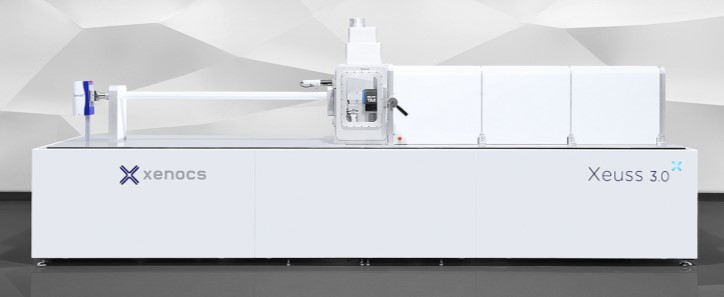 The versatile Xenocs Xeuss 3.0 supports wide q-range and covers USAXS, SAXS, and WAXS (0.0001–4.0 Å−1) to characterize a wide range of nanomaterials
The versatile Xenocs Xeuss 3.0 supports wide q-range and covers USAXS, SAXS, and WAXS (0.0001–4.0 Å−1) to characterize a wide range of nanomaterials
including polymers, biomacromolecules, and inorganic/metallic nanoparticles and films.
Capabilities include:
- Maximum q-range (0.0001–4.0 Å−1) for probing a wide range of length scales (1-1000 nm).
- Beamstopless data acquisition for minimizing parasitic scattering.
- Xenocs XSACT software for advanced data reduction and analysis.
- Temperature-controlled multi-sample stages.
- Grazing-incidence setup for thin films.
- BioCUBE and flow cell setup for measuring small volume of solution samples.
- Tensile stage and rheo-SAXS setup for in-situ measurements.
- Extendable space for customized in-situ experiments.
Technical Specifications:
- EIGER2 R 1M DECTRIS detector.
- Dual beam source (Cu and Mo) – automated switching between sources.
- Bonse Hart USAXS add-on with automatic alignment and switching.
- High-temperature Linkam stage (−150 °C to 350 °C).
- GISAXS module with motorized rotation stages.
- Multisample holder for powders and gels (up to 8 samples).
- Multi-capillary stage with temperature control (−10 °C to 80 °C; limited to 5–70 °C for aqueous samples).
- BioCUBE flow cell Assembly & cleaning pump system.
- Multi-purpose Peltier temperature stage compatible with multisample holders and flow cell (−20 °C to 150 °C).
- In-line UV/VIS spectrometer for BioCUBE full spectrum measurements (200–720 nm).
- Tensile force stage (force range: 0–20 N with 0.001 N resolution; tensile speed range: 0.1–5000 μm/s; maximum travel: 85 mm; temperature range: −150 °C to 250 °C).
- Table expansion with additional aperture for custom, large sample environments:
- Commercial rheometers, extruders, or 3D printers.
- Collimation path on rail for easy expansion of table surface.
- Wheeled base to mount additional equipment.
Contact: Kyungtae Kim
 The versatile Xenocs Xeuss 3.0 supports wide q-range and covers USAXS, SAXS, and WAXS (0.0001–4.0 Å−1) to characterize a wide range of nanomaterials
The versatile Xenocs Xeuss 3.0 supports wide q-range and covers USAXS, SAXS, and WAXS (0.0001–4.0 Å−1) to characterize a wide range of nanomaterials